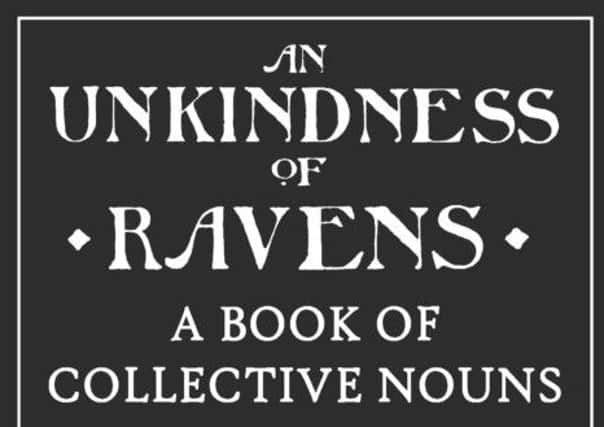Book review: An Unkindness of Ravens: A Book of Collective Nouns by Chloe Rhodes


Collective nouns – the words we use to describe groups of people, animals and birds – must be one of the most entertaining oddities of our rich and evocative English language.
Some are commonplace – a shoal of fish, a herd of cattle or a swarm of bees – but some are now almost extinct. For instance, how often do you hear people say an incredulity of cuckolds, a bellowing of bullfinches and a goring of butchers?
Advertisement
Hide AdAdvertisement
Hide AdThe origin of these amazing collective nouns comes under close scrutiny in this fascinating and revealing book from the pen of Chloe Rhodes, an honourable member of ‘a worship of writers’ who love to wrestle with the meaning and use of language.
Many of the words English speakers use every day, she reveals in her introduction, have their roots in the languages of ancient civilisations and most of our sayings and idioms were already proverbial in the Middle Ages.
But one particularly rich stream of historically resonant language is the collective noun. These highly descriptive terms were first recorded because they formed part of the education of the nobility, marking out the aristocracy from the less well-bred masses.
The handbooks in which they featured – known as Books of Courtesy – were designed to prepare young aristocrats for the formalities of their privileged lives and prevent them from embarrassing themselves and their families at court.
Advertisement
Hide AdAdvertisement
Hide AdSome of these terms have stood the test of time and are commonly used today while others have fallen by the wayside, perhaps because they are too little used or too whimsical to warrant a place in the modern English language.
In the pages of this beautifully designed and presented book, Rhodes explore the origins of collective nouns and sets them in the social context in which they would first have been used and by doing so, opens up a window onto the past.
The collective nouns of animals vary widely in their origins. Some are named for their characteristic behaviour, such as a leap of leopards, some like a burden of mules were used to describe their use to humans and some were named after the personalities they were believed to possess, such as an unkindness of ravens, a busyness of ferrets or a skulk of foxes.
Many of the nouns for people reflect humorous, sarcastic and even downright negative perceptions of their trade, craft or profession. We can judge for ourselves the sentiments behind a herd of harlots, a misbelief of painters, a superfluity of nuns, an abominable sight of monks and the rather wonderful phrases a laughter of hostelers and an impertinence of peddlers.
Advertisement
Hide AdAdvertisement
Hide AdAnd for pure entertainment value, a rascal of boys, an obstinacy of buffalos, a bloat of hippopotami, a drift of fishermen, a drunkship of cobblers and a damning of jurors take some beating!
This absorbing book, perfect for dipping into, includes everything you wanted to know about these evocative phrases. Indeed, it could well be called an incredible cornucopia of collective nouns.
(Michael O’Mara, hardback, £9.99)